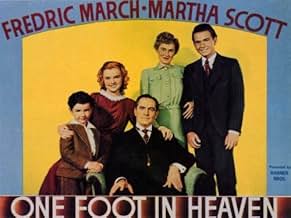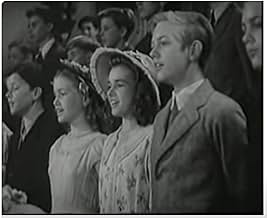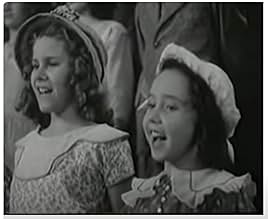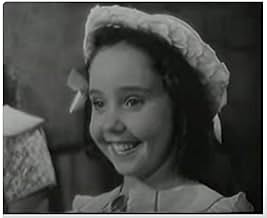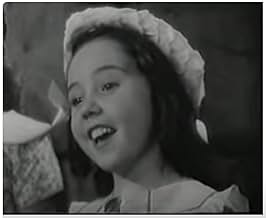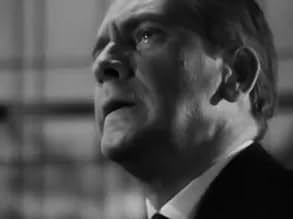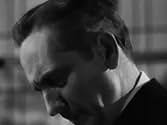AVALIAÇÃO DA IMDb
6,6/10
1,6 mil
SUA AVALIAÇÃO
Adicionar um enredo no seu idiomaEpisodic look at the life of a minister and his family as they move from one parish to another.Episodic look at the life of a minister and his family as they move from one parish to another.Episodic look at the life of a minister and his family as they move from one parish to another.
- Direção
- Roteiristas
- Artistas
- Indicado a 1 Oscar
- 2 vitórias e 1 indicação no total
Dorothy Adams
- Woman Behind Hope at Baptism
- (não creditado)
Joan Anderson
- Child
- (não creditado)
- Direção
- Roteiristas
- Elenco e equipe completos
- Produção, bilheteria e muito mais no IMDbPro
Avaliações em destaque
"One Foot in Heaven" is quite simply one of the most beautiful films that I have encountered. A mainstream film of this sort would NEVER even be considered today; it seems even a bit tame for 1940.
And yet, the world was vastly different then, and the gentle,loving tone of this film reflects a sort of "old-time" morality that seems hopelessly lost today.
This was a major Warner Brothers release and, with Hal Wallis as producer, one expects and gets a very high quality film which lovingly recreates scenes from the life of an ordinary Methodist minister during the first 40 years of the 20th century. No earth-shaking events here--just the day-to-day trials and tribulations, the simple joys and heartaches, the small-town politics and frustrations that reveal humanity in all of its imperfections.
I am amazed that Frederic March is sometimes regarded as a dull actor; he was the epitome of subtle, honest realism, and he carries the narrative of this film in an amazing way, tender, gracious, humorous, a bit stodgy--but always willing to "bend" when necessary, resourceful, loving, and above all, very human.
The movie is filled with an array of Hollywood's best character actors, and the extremely detailed sets, costumes, etc really serve as a "window" to another time and place in our American past.
Max Steiner's extremely pious score is almost a bit much at times, but it nonetheless adds a reverent strength to the proceedings.
And then, there is the final scene, one of the most moving and unique in any film that I know. Once again, the ultimate destination of the plot is nothing earth-shaking---but the concept and staging of the last scene is really remarkable. A simple, old-time street on a gorgeous spring day, the townspeople who have come to know and love their minister all stopping their work and joining the procession through the street as they follow the sounds of the carillon from the new church. Martha Scott, Frankie Thomas, Gene Lockhart, Beulah Bondi, Harry Davenport, Laura Hope Crews--many of whom have locked horns with Mr. March during the course of the film, now join together in the dappled sunlit street, finally arriving at the church where they all lift their voices together in the moving hymn "The Church's One Foundation"... as we see Mr. March himself seated at the carillon, struggling to continue playing it through the tears streaming down his face....
I think Turner Classics has a print of this film (I saw and taped it off of Chicago's PBS station some years ago). Try to see it; like the world it represents, this beautiful film may also disappear forever.
And yet, the world was vastly different then, and the gentle,loving tone of this film reflects a sort of "old-time" morality that seems hopelessly lost today.
This was a major Warner Brothers release and, with Hal Wallis as producer, one expects and gets a very high quality film which lovingly recreates scenes from the life of an ordinary Methodist minister during the first 40 years of the 20th century. No earth-shaking events here--just the day-to-day trials and tribulations, the simple joys and heartaches, the small-town politics and frustrations that reveal humanity in all of its imperfections.
I am amazed that Frederic March is sometimes regarded as a dull actor; he was the epitome of subtle, honest realism, and he carries the narrative of this film in an amazing way, tender, gracious, humorous, a bit stodgy--but always willing to "bend" when necessary, resourceful, loving, and above all, very human.
The movie is filled with an array of Hollywood's best character actors, and the extremely detailed sets, costumes, etc really serve as a "window" to another time and place in our American past.
Max Steiner's extremely pious score is almost a bit much at times, but it nonetheless adds a reverent strength to the proceedings.
And then, there is the final scene, one of the most moving and unique in any film that I know. Once again, the ultimate destination of the plot is nothing earth-shaking---but the concept and staging of the last scene is really remarkable. A simple, old-time street on a gorgeous spring day, the townspeople who have come to know and love their minister all stopping their work and joining the procession through the street as they follow the sounds of the carillon from the new church. Martha Scott, Frankie Thomas, Gene Lockhart, Beulah Bondi, Harry Davenport, Laura Hope Crews--many of whom have locked horns with Mr. March during the course of the film, now join together in the dappled sunlit street, finally arriving at the church where they all lift their voices together in the moving hymn "The Church's One Foundation"... as we see Mr. March himself seated at the carillon, struggling to continue playing it through the tears streaming down his face....
I think Turner Classics has a print of this film (I saw and taped it off of Chicago's PBS station some years ago). Try to see it; like the world it represents, this beautiful film may also disappear forever.
In a class I was taking we were assigned to watch this movie, and then, on paper, keep track of the conflicts that were found. I couldn't stop writing. It was one conflict after another.
I have just been moved to a new church, and though my problems were no where near what the pastor in the movie had to face, I learned a lot from it and I decided to share it with others.
We showed the movie at a Sunday Night service and it was well received and I recommend showing it to your churches. It generated a lot of laughter, especially the differences from then to today, but it also made many good points that hit home. I noticed a change in their attitudes the next day.
I have just been moved to a new church, and though my problems were no where near what the pastor in the movie had to face, I learned a lot from it and I decided to share it with others.
We showed the movie at a Sunday Night service and it was well received and I recommend showing it to your churches. It generated a lot of laughter, especially the differences from then to today, but it also made many good points that hit home. I noticed a change in their attitudes the next day.
Warner Bros. 1941 "One Foot in Heaven" was an inspired film. Based on a real person, William Spence, and adapted the from the biographic book by his son, Hartzel Spence, showed a truly rare individual who gave up his own medical ambition when he heard the call to serve as a Methodist minister. Directed by Irving Rapper, and with a musical score by Max Steiner, it was a crowd pleaser that continues to capture new friends, even today.
The success of the film lies on the fantastic portrayal of William Spence by Fredric March, who was at the height of his career. The character of Mr. Spence comes across as a no-nonsense man who must deal with the narrow mindedness of the small Iowa community he is sent to. Coming with his young wife, Mr. Spence was not prepared for what he would find in Laketon. The beautiful Hope, who came from another world feels inadequate in dealing with the church ladies who come to help her.
Mr. Spence gave his life to the town that didn't want any changes in their lives. When he proposed a new church to replace the older one, he meets the resistance of the elder moneyed classes. When they turn against him, they use every tactic, including slander to get him to his knees, but fortunately, he knew better. At the end, he was successful in giving the town what he envisioned was his contribution to the community where he spent his life.
Mr. March's performance is key that brings the action together. Lovely Martha Scott plays Hope Spence with dignity. The amazing supporting cast is wonderful. Gene Lockhart, Beulah Bondi, Moroni Olsen, and Grant Mitchell, among others do excellent job, something that was a hallmark of the Warner films of the time.
The success of the film lies on the fantastic portrayal of William Spence by Fredric March, who was at the height of his career. The character of Mr. Spence comes across as a no-nonsense man who must deal with the narrow mindedness of the small Iowa community he is sent to. Coming with his young wife, Mr. Spence was not prepared for what he would find in Laketon. The beautiful Hope, who came from another world feels inadequate in dealing with the church ladies who come to help her.
Mr. Spence gave his life to the town that didn't want any changes in their lives. When he proposed a new church to replace the older one, he meets the resistance of the elder moneyed classes. When they turn against him, they use every tactic, including slander to get him to his knees, but fortunately, he knew better. At the end, he was successful in giving the town what he envisioned was his contribution to the community where he spent his life.
Mr. March's performance is key that brings the action together. Lovely Martha Scott plays Hope Spence with dignity. The amazing supporting cast is wonderful. Gene Lockhart, Beulah Bondi, Moroni Olsen, and Grant Mitchell, among others do excellent job, something that was a hallmark of the Warner films of the time.
Being a preacher's kid is never easy. I was one, and so was my wife. This movie portrays in dramatic ways the humanity and humour of being a preacher's family living essentially on hand outs and never quite having the perfect home for the kids. I can relate to Hartzel, the eldest son. Like him I wished my Dad could have been anything else but a preacher. Like Hartzel I found out in many situations just how much Dad would go through for us.
This movie is nostalgic in many ways. It hearkens back to a time when values like vision, and sacrifice were highly esteemed, and were going the extra mile was not an option but an expected way of life. Sometimes, when I look back, I rewind this video and watch it.
It is a human story, wrapped up in the faith of a man and his family, who laid hold of a dream to make God real in every facet of life, and to show people that God cares about all of us. It is a story of trial and adversity and perseverance and triumph. In the end it is not the glory and accolades of man that matter, but of having lived a life well lived and full to brim.
The cast of this film is perfect and very believable. Some of the characters I have known personally in different churches my father pastored. It is as if they are in every congregation. The issues of never owning a home or being able to decorate as you please, or not having enough groceries, and even the leaky roof over our heads, all resonate. I have lived through them myself. These things really happened to the circuit preachers and those who went and started new churches. These things still happen.
It is a good script, and is not in conflict with the book. The book is well worth the read as well. I have both the movie and the book. It sits amongst my most prized possessions.
You will find yourself laughing, you will shake your head in disbelief, you will get ticked off, but in the end you will find yourself appreciating and loving this very human family that attempts to keep loving and keep living out what they believe, to love God and to love your neighbour as yourself.
This movie will reveal just how much and how full a life can be, and how meaningful it is to serve others. Gayle Sayers the Hall of Fame running back of the Chicago Bears said, "God first, others second, myself third." This is exactly what this movie is about. Getting the priorities right and living life to the full.
This movie is nostalgic in many ways. It hearkens back to a time when values like vision, and sacrifice were highly esteemed, and were going the extra mile was not an option but an expected way of life. Sometimes, when I look back, I rewind this video and watch it.
It is a human story, wrapped up in the faith of a man and his family, who laid hold of a dream to make God real in every facet of life, and to show people that God cares about all of us. It is a story of trial and adversity and perseverance and triumph. In the end it is not the glory and accolades of man that matter, but of having lived a life well lived and full to brim.
The cast of this film is perfect and very believable. Some of the characters I have known personally in different churches my father pastored. It is as if they are in every congregation. The issues of never owning a home or being able to decorate as you please, or not having enough groceries, and even the leaky roof over our heads, all resonate. I have lived through them myself. These things really happened to the circuit preachers and those who went and started new churches. These things still happen.
It is a good script, and is not in conflict with the book. The book is well worth the read as well. I have both the movie and the book. It sits amongst my most prized possessions.
You will find yourself laughing, you will shake your head in disbelief, you will get ticked off, but in the end you will find yourself appreciating and loving this very human family that attempts to keep loving and keep living out what they believe, to love God and to love your neighbour as yourself.
This movie will reveal just how much and how full a life can be, and how meaningful it is to serve others. Gayle Sayers the Hall of Fame running back of the Chicago Bears said, "God first, others second, myself third." This is exactly what this movie is about. Getting the priorities right and living life to the full.
Of course, it's impossible to tell how much of this story is dramatized and how much is real. And the gothic ideals of what a "church" should be are now very period--as they should be. But what makes this film work is the human nature presented through the characters. I say this because, as a (United) Methodist pastor, I know and have known the very types of characters represented in this film. And as one who sometimes wonders whether I'm fulfilling the mandate of my calling, this film was a welcome and refreshing reminder of maintaining my focus. It is probably a good insight for church members who want to get a glimpse of what life is truly like for a clergy person, then as now (though my parsonage is countless times better than what poor Dr. Spence had to live with!). A recommended dose of reality for the clergy-weary and the clergy-wary alike!
Você sabia?
- CuriosidadesWilliam S. Hart was the guest of honor at the Hollywood premiere of this movie, since his movie The Silent Man (1917) figures prominently in the plot.
- Erros de gravaçãoAt the beginning of the movie, William Spence (Fredric March) announces he has been "called" to the church and will become a pastor in the Methodist Church. His soon-to-be mother-in-law, Mrs. Norris (Nana Bryant)), replies that she would have preferred that he'd joined the Episcopal Church. At that time, in Canada, the dominant church was the Church of England, not the Episcopal Church. That is predominantly a US institution born out of the American Revolution.
- Citações
William Spence: [to his son, Hartzell] A pastor's family are in a special category. We are uh... Well, It's as if we walked a sort of tightrope. Balancing with one foot on earth and one foot already in heaven.
- ConexõesEdited into Happy Times and Jolly Moments (1943)
- Trilhas sonorasThe Children's Prayer
(uncredited)
from "Hansel and Gretel"
Music by Engelbert Humperdinck
Libretto by Adelheid Wette
Sung by the Robert Mitchell Choir
Principais escolhas
Faça login para avaliar e ver a lista de recomendações personalizadas
Everything New on HBO Max in June
Everything New on HBO Max in June
Looking for something different to add to your Watchlist? Take a peek at what movies and TV shows are coming to HBO Max this month.
Detalhes
- Data de lançamento
- País de origem
- Idioma
- Também conhecido como
- Con un pie en el cielo
- Locações de filme
- Empresa de produção
- Consulte mais créditos da empresa na IMDbPro
- Tempo de duração1 hora 48 minutos
- Cor
- Proporção
- 1.37 : 1
Contribua para esta página
Sugerir uma alteração ou adicionar conteúdo ausente

Principal brecha
By what name was Com Um Pé no Céu (1941) officially released in India in English?
Responda

